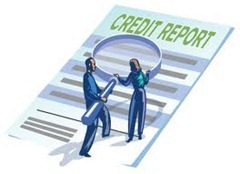Back when life was much simpler, when credit was in the form of a firm handshake and the person’s word that  they will repay the loan, the terms FICO (Fair Isaac Corporation), CROA (Credit Repair Organizations Act), FCRA (Fair Credit Reporting Act), among others, would have seemed like a foreign language. All anyone needed to do to “fix” their credit or to gain credit in those days was to “appear” credit worthy.
they will repay the loan, the terms FICO (Fair Isaac Corporation), CROA (Credit Repair Organizations Act), FCRA (Fair Credit Reporting Act), among others, would have seemed like a foreign language. All anyone needed to do to “fix” their credit or to gain credit in those days was to “appear” credit worthy.
In the early days of credit, a person’s credit worthiness was determined by the city “welcoming committee.” The welcoming committee would come to a new family’s home, bring gifts and greetings from the city, make conversation with the new husband and wife, take mental notes of their surroundings, their employment, lifestyle, religion, etc. Then they would pass the word about this family and essentially, word of mouth created their credit worthiness in that new city.
Fast forward half a century to September 30, 1996, President Bill Clinton signs into law the CROA (Credit Repair Organizations Act). This act is specifically designed to prevent unscrupulous companies touting their credit repair services as “guaranteed,” or the “cure to bad credit.” So many of these types of companies would prey on the desperate individuals or families who are in financial crisis that the families would be in a worse situation had they not hired the credit repair company.
The Basics of CROA
Credit repair companies cannot engage in the following:
- Make any statement which is untrue or misleading
- Advise any consumer to make any untrue or misleading statements
- Charge the consumer in advance for services
- Hold the consumer under binding contract (consumer has the ability to cancel at any time)
What Credit Repair Companies Must Do:
- Give the consumer 3 days to cancel without penalty or obligation
- Explain in writing the terms of the service including all guarantees of performance
- Perform what they promise to perform
Compliance of the CROA laws are enforced and regulated by the FTC (Federal Trade Commission).
When shopping for a company to correct your credit you would be wise to just ask them if they are familiar with CROA, and if they comply with its standards. Don’t do business with anyone who does not comply with the CROA standards.
A MAJOR Red Flag!
If any credit repair company suggests you obtain an EIN (Employer Identification Number) to use in place of your social security number they are soliciting fraud! Avoid them at all costs! (And possible prison time).
It is legal for anyone to have an EIN, as long as they are using that for their legitimate business purposes. To use an EIN in place of your social security number is known as File Segregation and is considered fraud.
So How Does Credit Repair Work?
It is completely possible to correct a bad credit history. It is not a simple or fast process. Avoid anyone who claims to be able to correct your credit seemingly overnight.
Credit repair is the process of leveraging your consumer rights per the Fair Credit Reporting Act (FCRA), the Fair Debt Collection Practices Act (FDCPA), and others to delete or have corrected any false, misleading, or unverifiable accounts on your credit reports. The disputes go to the credit bureaus (Equifax, Experian, and TransUnion), then the credit bureaus inform the creditor that there is a dispute with your account. The creditor has 30 days (or a reasonable amount of time) to conduct an investigation on that claim. The creditor will then contact the credit bureau with the results of the investigation. The credit bureau will then contact you regarding the results.
Often it is necessary to re-dispute items until they do get corrected or deleted off of your credit file. Persistence pays off when correcting your credit.
Get Your Credit Reports
You are allowed (by law) to obtain a free copy of your credit reports every 12 months from www.annualcreditreport.com. It’s a good idea to check your reports at least every year to look for errors. If you find errors, these can be corrected with the credit repair process.
